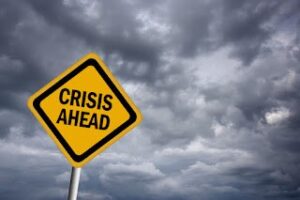Could your company survive a Hindenburg crisis?
How could a comparatively tiny investment research firm wreak billions of dollars in damages? In January 2023, American-based Hindenburg Research (named after the infamous 1937 Hindenburg dirigible disaster) plowed through Adani Group in India. The firm publicly released a detailed report that alleged Adani “has engaged in a brazen stock manipulation and an accounting fraud scheme over the course of decades.”
Within a month, Adani Group suffered a staggering $150 billion loss in value.

Shortly thereafter, IEP’s stock price fell by almost 63% and the company’s market cap was cut by more than half from $18 billion in early May to barely $7 billion by the end of the month. Both Adani and IEP are still recovering.
The loss of trust holds a fearsome outcome.
Crisis awaits the unprepared
While these all represent crises engulfing huge companies with global operations (and a juicy target for a high-powered investment activist firm), many of the factors that can create a company-threatening crisis are similar for small and medium-sized companies alike.
In fact, from a scale perspective, smaller companies may be even more vulnerable to unanticipated crises, given the comparatively limited resources available for defense and recovery. A crisis can be magnified if (and, of course, when) it occurs in the digital realm, where a ransomware attack or hack seizes data and paralyzes corporate operations.
What about your company?
A company-threatening crisis at any level typically affects business continuity and other issues that challenge or threaten reputation, brand, financial strength and stakeholder perspectives, including customers and clients.
Despite recently enduring a global pandemic-fueled crisis that changed much of how contemporary businesses operate today, estimates of companies who don’t have (or have not updated) a crisis communication and business continuity plan run as high as a full 50% of all companies.
Are you prepared?
If a crisis – employee scandal or issue, the onslaught from a ransomware attack, bad financial news, a devastating customer complaint, a storm that knocked out your corporate facilities, a loss of stakeholder confidence, or other – hit 10 minutes after you finished reading this column, how would you and your company react? Would you still be in business 30 days from now?
The Golden Hour
Preserving business continuity and quick recovery time can often boil down to how you handle the “golden hour” – the minutes and time shortly after a crisis erupts. Crises sometimes used to unfold in slow motion. But in an internet age, bad news can digitally ricochet around the world – and especially among your key influencers and market space – literally in a matter of seconds. Images that can potentially condemn your company and reputation can be posted and reposted hundreds (re: thousands) of times on social media, amplifying a potentially “small” crisis into a company-menacing disaster.
A full-blown crisis communications plan can be complex, but whether simple or complex, there are certain must-haves in any plan. Check these off your list as you plan (or update):
Completing an honest and obviously confidential) appraisal and threat assessment of possible crisis scenarios. Where is your company vulnerable? What keeps you awake at night? Your short list is extraordinarily valuable, but you need input from all quarters: management, human resources, legal, financial and risk management, and more.
Build your core team and define responsibilities. How will your core crisis team be alerted and assemble? (you need a confidential key personnel list of cell phones for calls and texts) Who can speak publicly? How will messages get prepared and cleared? Who is responsible for tracking down critical information? Who posts online and tracks sentiment online?
A quick sidebar: oftentimes lawyers and PR are philosophically at odds in releasing information. Lawyers rightly want to limit liability exposure and future issues. Public relations and corporate communication professionals want to preserve and shore up reputation, brand, perception, market share. Agreeing in advance on roles and responsibilities will go a long way to reducing confusion when a crisis hits. Also, don’t forget that an honest statement at the very beginning that acknowledges that a company doesn’t yet have the facts but will be regularly releasing and updating information can go a long way to buy time and preserve credibility.
Who needs to be contacted? – who are key stakeholders? Identify these people and groups in advance.
Prepare and pre-position general statements for each of your major crisis scenarios. Vet those thorough your legal, financial and HR resources in advance so you can plug in key info and maximize your “Golden Hour.” You must be prepared to at minimum to acknowledge an emerging situation publicly.
How will you communicate? In-place online resources and capacity is critical. You don’t need to be tracking down who has access to your company’s website and social media platforms in the minutes after a crisis erupts.
Go to the effort to formalize your plan, even if you completely update it later. Confidential copies – especially the directions for maximizing the time within the “Golden Hour” – need to be in the hands of your core crisis team before the crisis hits.
Get started
Obviously, a comprehensive crisis plan goes far beyond these general points, but these will get you started. Being prepared can be the difference between a comparatively short-lived situation and a company-devastating disaster.
Want more information or just a sounding-board to discuss? Contact us today.
By Michael Snyder, Managing Principal, MEK. A crisis communication veteran strategist, Snyder has guided numerous clients through the development of crisis plans; his experience includes serving as a crisis spokesperson, plan prep, and key message/content developer.
